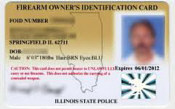

Marijuana Legalization and Armed
Self-Defense Pose Legal Paradox
![]()
By Kurt Hofmann, April 26th 2014
JPFO writer contributor, © 2014.
 Last July, with Illinois poised to legalize medical marijuana (albeit just barely legalize it, under the most restrictive legal cannabis policy in the country), it seemed more than logical to assume that the intersection of the state's new, restrictive marijuana law and its historically very restrictive gun laws would be a ban on anyone benefiting from both the most effective means of self-defense and the therapeutic effects of marijuana. And indeed, in January, the Illinois Department of Public Health proposed a new system of rules that would do precisely that, and more. From the proposal:
Last July, with Illinois poised to legalize medical marijuana (albeit just barely legalize it, under the most restrictive legal cannabis policy in the country), it seemed more than logical to assume that the intersection of the state's new, restrictive marijuana law and its historically very restrictive gun laws would be a ban on anyone benefiting from both the most effective means of self-defense and the therapeutic effects of marijuana. And indeed, in January, the Illinois Department of Public Health proposed a new system of rules that would do precisely that, and more. From the proposal:
That the applicant [for a medical marijuana registry card] understands that a qualifying patient or designated caregiver with a current Firearm Owners Identification Card or a Concealed Carry Weapons Permit who is approved for a registry identification card shall be in violation of and may not possess firearms under relevant state and federal law. As such, registered qualifying patients and designated caregivers are not eligible for a Firearm Owners Identification Card or a Firearm Concealed Carry License and may be subject to administrative proceedings by the Illinois State Police if they do not voluntarily surrender such card or license.
So under this proposal, exercise of the Constitutionally guaranteed, fundamental human right of the individual to keep and bear arms would be denied not only the patient, but also the "caregiver" (the person authorized to obtain and transport the marijuana, if the patient's condition makes that too difficult), because . . . well, just because.
 And then, lo and behold, and to the shock of anyone familiar with Illinois' great love of nanny-state paternalism, the state announced last Friday that under pressure from advocates of both marijuana reform and gun rights, the proposal had been dropped, and that the state will not require revocation of one's Firearm Owners Identification (FOID, required in Illinois to buy or possess a firearm or ammunition) or concealed carry license.
And then, lo and behold, and to the shock of anyone familiar with Illinois' great love of nanny-state paternalism, the state announced last Friday that under pressure from advocates of both marijuana reform and gun rights, the proposal had been dropped, and that the state will not require revocation of one's Firearm Owners Identification (FOID, required in Illinois to buy or possess a firearm or ammunition) or concealed carry license.
It should be noted, though, that with the Illinois State Police administering the issuance of FOID cards and concealed carry licenses, and conducting background checks on both the prospective patients and their caregivers, the ISP can easily know about anyone who has submitted paperwork for use of both marijuana and firearms. Whether or not they would deny the issuance (or renewal) of one, based on the applicant already having the other, is not quite clear.
 Then, of course, there is the little issue of no matter what Illinois or any other state does, the federal government still considers gun ownership by a marijuana user to be a felony. Writing for Reason.com, Jacob Sullum notes that this is how former New York City Mayor and eternal anti-freedom busybody Michael Bloomberg likes it. With Bloomberg's biggest goal in the "gun control" sphere being background checks for all prospective gun purchasers, and with him identifying himself as "a believer that we should enforce the laws [and why does that sound so familiar?], and I do not think that decriminalizing marijuana is a good idea," he is clearly in favor of forcible disarmament of all marijuana users, without regard to whether or not the use is for medical purposes.
Then, of course, there is the little issue of no matter what Illinois or any other state does, the federal government still considers gun ownership by a marijuana user to be a felony. Writing for Reason.com, Jacob Sullum notes that this is how former New York City Mayor and eternal anti-freedom busybody Michael Bloomberg likes it. With Bloomberg's biggest goal in the "gun control" sphere being background checks for all prospective gun purchasers, and with him identifying himself as "a believer that we should enforce the laws [and why does that sound so familiar?], and I do not think that decriminalizing marijuana is a good idea," he is clearly in favor of forcible disarmament of all marijuana users, without regard to whether or not the use is for medical purposes.
 The prohibition on guns for those involved in the marijuana trade, even when that trade is legal under state and local law, is indeed such that when sheriff's deputies in Los Angeles wanted (for whatever reason) to frame the proprietor of a marijuana dispensary, they did so by "finding" guns they had planted on the premises.
The prohibition on guns for those involved in the marijuana trade, even when that trade is legal under state and local law, is indeed such that when sheriff's deputies in Los Angeles wanted (for whatever reason) to frame the proprietor of a marijuana dispensary, they did so by "finding" guns they had planted on the premises.
In the final analysis, anyone who wishes to avail himself of both the right to keep and bear arms and "legal" marijuana might be best advised to keep at least one of the two "off the books."
.Was this information valuable to you? If so, please consider donating, becoming a member or renewing your membership, or buying a DVD, book, tee-shirt, or other gear at our JPFO store.
A former paratrooper, Kurt Hofmann was paralyzed in a car accident in 2002. The helplessness inherent to confinement to a wheelchair prompted him to explore armed self-defense, only to discover that Illinois denies that right, inspiring him to become active in gun rights advocacy. He also writes the St. Louis Gun Rights Examiner column.
![]()





































